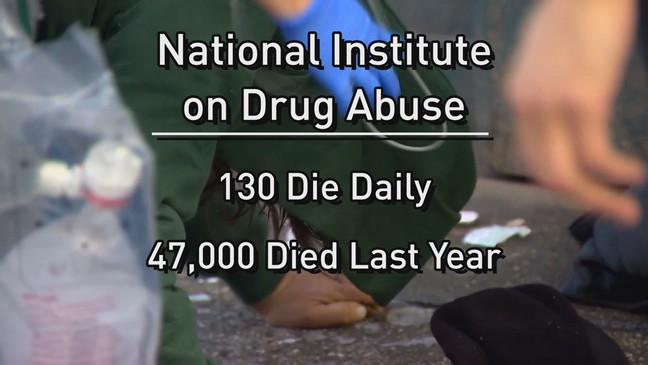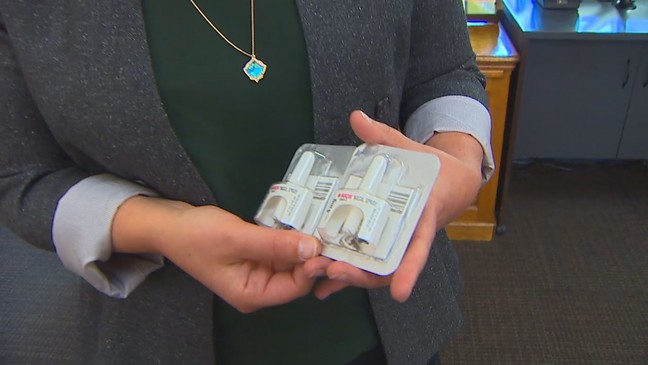SNOHOMISH COUNTY, Wash. — Jessica Reyes spends her days worrying about her son Christopher, wondering whether he’ll ever overcome his heroin addiction.
“Every day you drive down the street and you look both sides to see if Christopher is there,” Reyes said.
It’s been more than two years since she held him.
“You don’t give up on your kids, so we’ll be ready when he decided that it’s time,” Reyes said.
Wanting to learn, and needing to be ready if Christopher comes home, Jessica recently joined a group in a library basement to learn about Narcan – the prescription medication that can pull someone out of an opioid overdose.
Educators, librarians find themselves on the front line of the opioid crisis{ }{p}{/p}Security guard Cody Goeschl used the medication to save a woman’s life inside a library restroom a few weeks ago.
“All the signs. Her eyes were red her pupils when I looked at them were constricted and then, sure enough, when I checked her bag I found two syringes so I could tell it was heroin use,” Goeschl said.
Though he hadn’t been trained to use Narcan, Goeschl grabbed the medication the library had stashed behind the counter.
“I administered the Narcan to her and pretty much two to three minutes she started coming to,” he said.
Communities across the nation are being ravaged by the opioid epidemic and are turning to Narcan as the answer.
In Snohomish County, police have revived 227 people with Narcan since 2015. Learning to use Narcan is as important as learning CPR.
According to the National Institute on Drug Abuse, more than 130 people in the U.S. die every day of an opioid overdose. More than 47,000 people died last year alone.
“It’s everywhere, it’s not focused in one area, one specific place, it’s all around us. It’s our neighbors, it’s our family members, it’s people that are at risk,” said Amy Hill, an opioid outreach specialist with Snohomish County.
The Everett Public Library System has taken a unique step to battle the crisis.
For the last two years, they’ve been training employees how to use Narcan.
Library director Abigail Cooley says libraries are one of the few open spaces where people can linger for hours. She says libraries across the nation have seen an increase in drug use and reported opioid overdoses.
“Obviously it’s a situation we wish we didn’t have to face, but it is reality in the world we live in today,” Cooley said.
In Seattle, Mayor Jenny Durkan is considering requiring every public library in the city to stock Narcan as well.
“We’ll see where the need is. We know going into the future that having Narcan is the new CPR, it’s a very sad thing but a true thing. It saves lives,” Durkan said.
And it’s not only libraries, nightclub owners in Seattle are taking their own steps to save lives. As well as some school districts.
“Who would have imagined that we would have to, that this was something that we’d have to add to our repertoire of things we have to do?” said Greg Schwab, assistant superintendent for Edmonds Public Schools.
For Reyes, she also never thought learning how to use Narcan was something she needed to know.
“It makes me feel like I’m being useful, it’s a little bit in my control when so much else isn’t,” she said.
The conversations happening in Western Washington among librarians, educators, nightclub workers and families are being had in communities across the nation.
The U.S. Surgeon General himself says he’d like to see Narcan in the hands of more Americans and as accessible as heart defibrillators.
Source: Educators, librarians find themselves on the front line of the opioid crisis | KOMO

